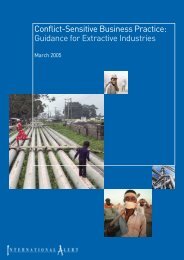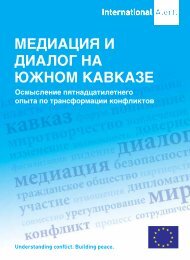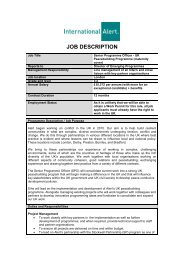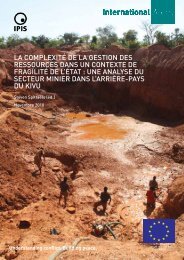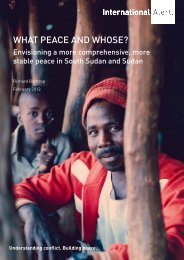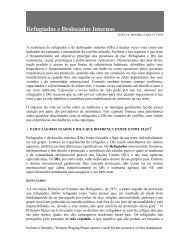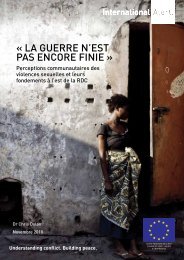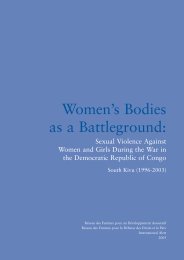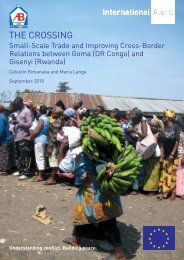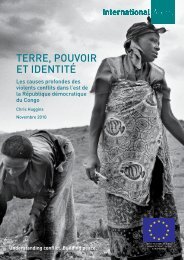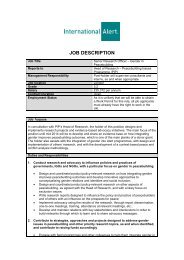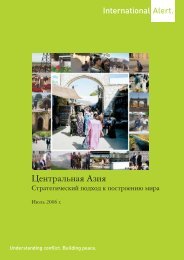Full report - International Alert
Full report - International Alert
Full report - International Alert
Create successful ePaper yourself
Turn your PDF publications into a flip-book with our unique Google optimized e-Paper software.
IA’S DEPUTY SECRETARY GENERAL,MARTIN HONEYWELL, THE FEDERALMINISTER FOR WOMEN’S AFFAIRS, HAJIAAISHA ISMAIL, THE THEN STATE MINISTERFOR WOMEN’S AFFAIRS, MRS BECKYKETEBOU-IGWE, AND PARTICIPANTS OFTHE BANJUL CONSULTATIVE MEETING.For effective implementation of this project, IA and our Niger Delta partnersdecided to co-opt more women so as to be more representative of thecommunities in the Niger Delta, and as a result this needs assessment wascarried out in July 2002.2.2 Why was the Niger Delta needsassessment necessary?The main goal of the needs assessment was to gather information for thedesign of an appropriate capacity building intervention strategy for the NigerDelta, utilising women as a strategic focus group. It was instructive that theneeds assessment meeting coincided with the period of the take over of theChevron-Texaco flow station by the women of Ogborodo community (knownas Escravos). The experience further highlighted the critical potential ofwomen as an organised force to achieve transformative change. It isimportant that trainers have an understanding of the dynamics of the groupprior to the design of training intervention, in order to design a high impactingintervention strategy. The needs assessment was useful in this respect as ithighlighted class, gender and group dynamics in the Niger Delta.The needs assessment also provided an opportunity to evaluate the work andchallenges encountered by the initial group of women from the Niger Deltawho met in Banjul in August 2000. The initial group had expanded and theassessment therefore highlighted other possible leadership potential for amore effective critical mass and strategic network of women in the Niger delta.2.3 MethodologyA literature review to provide background information to the rich politicaland economic history of the Niger delta was undertaken.The needs assessment was conducted in July 2002 by a team of threewomen trainers: Amina Salihu, Programme Officer in charge of training at the
MOST OF THE HEALTH RELATEDILLNESSES REPORTED BY THECOMMUNITIES IS LINKED TO THEENVIRONMENTAL POLLUTION GENERATEDBY OIL EXPLOITATION ACTIVITIES SUCHAS: OIL SPILLS, GAS FLARES, ANDCONTAMINATION OF WATER AND OIL.3.0 ISSUES ARISING FROM THENEEDS ASSESSMENTThis section is divided into six sections: a broad introduction to the contextof the Niger Delta, followed by five sub headings outlining critical issues ofconcern which emerged out of the process of consultation from thepeople’s perspective.3.1 Context of the Niger DeltaThe Niger Delta, the main oil and gas producing area of Nigeria, has beendescribed as one of the largest wetlands in the world. It covers an area ofabout 70,000 square km and consists of four distinct ecological zoneswhich are characteristic of a large delta in a tropical region: coastal ridgebarriers, mangroves, fresh water swamp, forests and low land rain forests(Sagay,2001; Okonta and Douglas, 1999; Herbert, 2002b). Thecommunities that inhabit the area are made up mainly of fisher persons inpurely riverine areas, and farmers in the drier areas. They also have somelocal industries such as salt and mat making, which are dependant on themangrove and surrounding swamp waters (Sagay, ibid). In 1956, the first oilwell was sunk at Oloibiri, and oil became very important to the Nigerianeconomy. The oil industry has brought economic benefits to themultinational corporations and the Nigerian government, but has broughton the ]indigenous people of the Niger Delta environmental problems,ecological degradation, health hazards and poverty.The plundering of the resources in the Niger Delta started in the early 20thcentury with the Sapele wood and Palm oil. Sapele wood became a symbol
15 • NEEDS ASSESSMENT REPORT NIGER DELTA, NIGERIAOfombongha in Cross Rivers State, where there is dispute over land. Women spend long hoursin the fields and use very basic tools to cultivate the land, such as knives and machetes. Mostwomen farmers have no access to fertilisers. They have no proper means of transport to carrytheir produce and have to walk long distances with heavy loads on their heads. There are notenough markets within the communities to sell the products.Furthermore, where women apply their direct labour, the share of income they receive is less thanthat of the men who have expended less energy. Farming is one such example. In Obubura, CrossRiver State, women till the yam crop twice before it is harvested, participate in its harvest, carrythe crop home, help the men with the storage in the barns, prepare some of the crop for domesticuse, take the crops to the market to sell and give 2/3 of the income to the men, keeping only 1/3for themselves. 6 Apart from yam, women also plant ‘female crops’ 7 such as leafy vegetables,cassava and cocoa yam. However, due to the scarcity of resources, women farmers are facingcompetition from their male counterparts. In Yakuur community for example, men are nowplanting “female crops”, such as cassava and making more money out of it than women.What were the women’s economic needs?What we found was not absolute poverty, but relative poverty as well as an under-utilisation ofcapacity. This is largely because of a lack of access to opportunities and simple basic needs,which can transform lives. The women wanted opportunities for trade, markets for their fish,skills such as preservation techniques, typing, computing, hairdressing for the youth, skillsacquisition centres and financial capital - through micro credit and grants. A creative way toaddress access to credit is through the esusu or thrift contribution amongst members, whichaugments their income. Members of the group we spoke with in Ubeji community belonged tomany forms of thrift societies. On the other hand, in the agrarian communities we visited,respondents expressed the desire to have alternative sources of income to supplement incomefrom agriculture and also employ their energy during non-farming seasons. The womenexpressed the need for basic facilities such as an upland toilet as opposed to a riverside toilet,which gets washed away whenever the floods come.3.3 The community and Oil Multinational Corporations(MNCs)The gender dimension of oil exploitationSix oil companies operate amongst the communities visited; they are Texaco, Total Fina - Elf,Shell, Mobil, Chevron and Agip. Just like any other community, life in the Niger Delta dependson the environment. The river is key to all the activities in the region. It is all at once the sourceof transportation, livelihood, drinking and cooking water. In addition, the river also traditionallyserves as a bathroom and toilet for the community. In this context, water pollution in the NigerDelta is a critical issue. Pollution occurs through acid rain and oil spillage 8 and action that willaffect the natural flow of the river, such as diverting its natural course of flow.Women are amongst the most affected by oil exploitation activities. By taking away their land foroil production and polluting the creeks and rivers, the MNCs have contributed to the destructionof women’s livelihood and the marginalisation of women’s work. In the Iko community (Akwa Ibomstate), Shell diverted the course of the river in order to build a wider waterway for oil transportation.As a result, the river and the mud flats, which were once a source of livelihood for fishing,transportation and trade by boat from one community to another, had become stagnant. Thecommunity, especially women, could no longer fish for lobsters, shrimps and periwinkles.
16 • WEST AFRICA PROGRAMMEA NOTICE PUT UP BY LOCALS IN NTAFERECOMMUNITY, AKWA IBOM STATE, TOINDICATE A TOXIC WASTE SITE AS ARESULT OF OIL COMPANY ACTIVITIES.In Ubeji Community, in Delta state, women contract infection when they usethe stagnant water from the river to clean up after defecating. The oilcompanies sometimes made promises to the communities to redress someof the damages, through clean up exercises and provision of credit supportto the community. The team was informed that although women sufferdirectly from the brunt of environmental degradation through theirproductive and reproductive roles, the oil MNCs marginalise women indiscussions with the communities on ways of ameliorating the damage tothe environment 9 . This could be because the community leaders, who aremale, are presented as the spokespersons of the communities. Even ininstances where women go directly to the oil companies to raise issues ofdirect concern to them, the companies are reluctant to deal directly withthem. While the traditional rulers are the de jure rulers, the youth haveemerged as the de facto leaders of the community, who are recognised asa vital force in responding to and setting the community needs and agenda.Women of Ubeji would like the oil MNCs to deal directly with the womenrather than through representatives 10 .The responsibility profile of MNCsA recurring theme during the needs assessment was the perception ofcorporate culpability or the level of responsibility of the oil MNCs. It wasgenerally agreed that Shell was most culpable and Mobil the least.Description of the degree of corporate responsibility was relativised.Communities gave a pyramid of responsibility of the MNCs. Interestingly,even where certain MNCs were not operating, communities were able torank them based on the information they had about their corporateresponsibility profile. There was also an assumption that some communitieswere better off because their ‘resident oil companies’ provided for theirsocial needs 11 . Even people who live in communities where Mobil prospectsconcede that they have fewer problems than they hear communities in Shellprospecting areas. Even in Ikolor (Bayelsa state) where Agip has oil headsbut is yet to begin prospecting, Mobil was also thought to be a moreconsiderate oil company. The question is, would Mobil continue to be asresponsible a corporate citizen if it had a spread similar to that of Shell? 12Table 1: Oil producing profile of communities visitedOil producing CommunitiesIko in Akwa Ibom stateIkolor in Bayelsa stateEgi land River stateIbeno in Akwa IbomNon Oil producingYakurr in Cross River stateObubura in Cross river stateOdi in Bayelsa state3.4 Democracy and governanceCommunity perception of the Federal GovernmentNigeria operates a federal system of government, which recognises threetiers of government: the Federal, the State, and Local government. Nigeriais a mono cultural economy with reliance on oil export as the primary source
17 • NEEDS ASSESSMENT REPORT NIGER DELTA, NIGERIAof revenues. This oil comes from the Niger Delta. Therefore as a way of ensuring equity and evendevelopment of the Niger Delta, oil-producing states are entitled to 13% derivation of nationalrevenue. In addition, there is the Niger Delta Development Commission (NDDC), established toaddress the social and infrastructural development of the Niger Delta. We noted that no groupthought of the federal government as having any key role in the development of the Niger Delta.Even with the establishment of the NDDC, Abuja was described as being too far away - in botha physical and policy sense. Where there are government development activities, self-sustainingmechanisms are not built into the project design. For example, the Country Women Associationof Nigeria (COWAN), a Nigerian NGO, worked in conjunction with the Family SupportProgramme created by the then wife of the head of state Mrs. Maryam Abacha, to build a gindistillery for Arogbo community in Ondo state. This is one of the few communities in Ondo statewhich has oil. The project folded after a year of operation because there was no provision formaintenance of the machinery. The local government was described as nearer to the peoplegeographically, however the communities say this proximity does not translate into qualitativechange in the lives of the mass of the people. In some instances the local governmentheadquarters were referred to as sites of marginalising the minority groups within the Niger Delta.A government bureaucrat and researcher in the Niger Delta once asserted that there are nodevelopment policies on the Niger Delta 13 . His reasoning was that what can be regarded aspolicies are disconnected from the people and even where consultations take place, theresultant policies do not address the problems mentioned. According to the Land Act of Nigeria,any place where minerals are found is designated a minefield and so no infrastructuralinvestment can be made in such a zone (Omoweh, 2002). The whole of the Niger Delta has amineral resource- oil- and is thus an oil field in the logic of the Land Act. The meaning here being,the Niger Delta should not expect development because it is an exploration field. One mayhowever ask the question: what came first, the oil field or inhabitation? If it is the latter, then thestate has one of two options: resettle the people elsewhere with adequate compensation, ordesist from exploration near communities.Community perception of Oil MNCs and the StateCommunities are quite clear that the State is separate from the oil companies in terms ofprovision of amenities for the people. They feel, however, that certain elements within the
18 • WEST AFRICA PROGRAMMEgovernment must be colluding with the oil companies on the degradation of communities’ landand water to have reached such a grand scale. While they do not blame the oil companies alone,the companies are physically present exploring and damaging the environment. As such, the oilcompanies are seen as guilty due to their direct activities (and the government by its absence),and the communities therefore expect them to redress this injustice. In Iko for instance, theenvironmental neglect by Shell is attributed to the fact that none of Shell’s administrativestructures are in Iko, therefore Shell has limited contact with the everyday realities of the people’slives. This is in comparison to Mobil, which has its terminus and staff residences in Eket, andthus has had to provide a good road network for Eket. Shell is regarded as detached from theconcerns of the people.Many criticisms of Shell and other MNCs in Nigeria have focused in the issue of the culpabilityof the Nigerian government co-operating with the MNCs in depleting the resources of the NigerDelta. Inasmuch as Shell might be less than responsible as a corporate citizen, it has its allies ingovernment, which are colluding with Shell to exploit the people, rather than protect them. Whyis Shell more sensitive to the environment in the northern countries where it exploits oil than it isin a southern country like Nigeria? In Effurun Delta state, we learnt that the main culprit was thegovernment, by supporting the Nigerian National Petroleum Corporation’s (NNPC) refinery. TheNNPC washed its effluent directly into the river 14 . Also in this State, it was alleged that theNigerian navy confiscated a prime agricultural parcel of land belonging to the community. Thisland was being designated as a naval base, even though it was far removed from the sea andwas not used by the navy.Women’s participation in party politicsParticipants demonstrated an awareness of politics, while at the same time registering theirdisillusionment with partisan politics, i.e. voting and/or contesting for public office. Minoritycommunities are not able to go beyond fielding a local government councillor as the majoritygroups usually take the local government chair. Women are, however, increasingly aware of theneed to encourage women to vote and seek elective offices. Even though there is theapprehension that men will not be willing to concede political space to women, women by theirsheer number and influence can have an affect on local politics.3.5 Gender relationsMarginalisation of womenThe Niger Delta is no different from many other patriarchal societies. In the communities wevisited, traditional rulers, village heads or chiefs, as the case may be, acted as the communitygatekeepers, and needed to be informed about all events taking place in the community. Evenwhen we wanted consultations to be held in a woman’s home, the women took us to thecommunity head, who was invariably male. We learnt that informing the community head aboutstrangers visiting assures the community, through its head, that the intentions of the visitors arehonourable. To this end, the meetings were almost always held in the house of the head of thecommunity, conferring legitimacy and security on the meeting.The decision to hold the meeting at the house of the village head may also be a placatory stepin cases where the head was not informed about the meeting beforehand. They say the venuemakes the event, and the women believe that the chief’s house confers status on the meeting,and gives the women’s group more respect in the eyes of the visitors and the community andmight even win the group more members. In any case, the chief has a bigger, more comfortable
19 • NEEDS ASSESSMENT REPORT NIGER DELTA, NIGERIAindoor space than most members of the community. The problem that this creates, however, isthat the chief and members of his council who join the group take up more dialogue space thanis healthy for a group.As custodians of the community who have participated in many discussions concerning thepreservation of the community, they are more knowledgeable about events than are the women,who are primarily responsible for child rearing and economic activities 15 . Strategic as this may be,it does not translate into power to make or participate in decision-making. In instances wherewe were able to have a women only group, such as in Ibeno and Obubura (only one man), theresponse was more spontaneous, though history and statistics were sometimes hazy. Thewomen were able to express their expectations and explain why these have been met or not,and what strategies they have used.Class and GenderClass here refers to access and control of the means of production. Poorer women, such asworking and peasant women in local communities, accused rich women, who have greateraccess to state resources, either by virtue of their education or links to the ruling class, ofexploiting them 16 . The class dimension comes in here, where women have been excluded fromaccess to formal education and active participation in decision making, they are likely to knowless than the men about the affairs of the community. This category of women are more likely tocapitulate to what they may perceive as the superior logic of the men who are educated. As aresult, while we got more information from groups where men joined in the group discussion, itsometimes left women out of the picture.Poverty in the Niger Delta is relative rather than absolute. In communities where the group wasmade up of women who had a steady and substantive means of livelihood or entrepreneurship,contribution to the needs assessment team was usually elaborate. Educated members who hadthe double qualification of possessing economic means and a western education were theentrepreneurs. In such instances, a speech was usually prepared which highlighted theachievements and challenges of the community and its women 17 . They also wore uniform attireas a mark of solidarity and organisation. The uniform attire also helped formalise the occasionand conferred respect on the visitors 18 .On the other hand, poorer women, while also demonstrating a capacity to inform the needsassessment, usually recounted their achievements and challenges orally, having few or no writingskills. In groups where the majority were not literate, the literate few were presented as the leadersor part of the leadership. The leadership was, however, usually deferred to someone who wasolder and wealthier, although this also varied depending on the specific goals of the organisation.The needs of the various groups were sometimes so different it was difficult to establish acommon thread. The need for a skills acquisition centre was a common demand across classes.However, in Arogbo community, where we met a mixed class of royal wives, educated women,schoolgirls and peasant farmers, all within one group, the school teacher outlined the needs ofthe community. One of the crucial needs was a photo laboratory; this was seen as strategic sothat colour pictures could be produced in the community rather than taking films to Benin forprocessing, which takes months. At face value one might be tempted to say that a photo lab isnot a priority for addressing poverty. However, a closer look revealed that it is a strategic need,which can generate basic needs like generating employment and learning skills, in addition todocumentation of community life. Earlier groups had only identified immediate practical needs.
20 • WEST AFRICA PROGRAMMEWOMEN IN THE ANAKPA URUAMVILLAGE WEEDING THE ONLY ACCESSROAD TO THE VILLAGEThe women’s siege of Chevron-Texaco terminus in EscravosThere is no such thing as women’s issues- all issues are women’s issues. Although women mayhave specific concerns relating to biology or lack of rights, they also share the concerns of allcitizens. The much <strong>report</strong>ed picketing of Chevron-Texaco Communities in Escravos (local name,Ogborodo) by the women of Ogborodo is an example of this fact. Communities are relying onwomen’s roles as biological agents and community organisers to plan and execute protestagendas. Women organising to confront institutional oppression of this nature are motivated andpushed by the community, rather than by women’s issues alone. However, it demonstrates thepotential of women to influence the direction of policy in the Niger Delta when properly mobilised.Na woman dey get bellebut for Chevron na manI don come join una get belleThe quote above describes the experience and the reason for the take-over of the Chevron-Texaco tank farm in Ogborodo, from the standpoint of an Ogborodo woman living in Warri,Madame Afua Oriarifume. For 8 days in July 2000, over 200 women, both in and outside
21 • NEEDS ASSESSMENT REPORT NIGER DELTA, NIGERIAOgborodo, held the oil companies to ransom. The quote describes in a theatrical way howwomen intimidated Chevron staff during the occupation. “Belle” means pregnancy in Pidgin. Thisstatement is a pregnancy pun, meaning it is normally only women who carry pregnancy, but atChevron, men also carry pregnancy, and today I [women] have come for my [their] share of [the]‘pregnancy’. The metaphor of pregnancy is used to refer to the folds, fat and pouches many ofthe affluent male executives of the oil company carry. It is an allusion to the decadence andaberration the oil companies represent to the communities, and an expression of the people’sdisdain for unequal distribution of wealth. While the villagers are dying of hunger and diseasetheir sensibilities are assaulted by men who have grown fat on their land; men who raise theexpectations of the people then dash their hopes while exploiting the people’s resources to boot.3.6 Health facilitiesWith the exception of Yakurr, which had a general hospital 19 , none of the communities we visited hada specialised hospital. The worst-case scenario was Ikolor where there is no health facility andwomen in labour have to travel long distances in boats to get to medical help. Ikolor women werealso concerned about the high child mortality and morbidity rate. In Odi, the needs assessment teamfound that 3 years after the Odi state repression in the community in 1999 (Ekine, 2002), people arestill living with the mental trauma of the experience which left many prosperous farmers and tradersdestitute. We were told about a rise in cases of high blood pressure and depression, which did notexist prior to the invasion of Odi but ‘came with the army’. This needs further investigation.3.7 Poverty of TimeApart from material poverty, there also exists a poverty of time. Women literally have a 24-hourclock, this leaves them little time to participate in recreation activities. Through their ingenuity thewomen do, however, manage to preserve the culture of the community, through age gradeactivities, dance groups, weddings and other ceremonies.
22 • WEST AFRICA PROGRAMME4.0 THE IMPLICATION OF FINDINGS FORTRAINING DESIGN: Women’s needs in the areaof development, conflict transformation, capacitybuilding and organisational development.Women’s practical and strategic needs: The capacity building intervention will have toaddress a healthy mix of community and women’s concerns, which can help women transformpersonal and community life.Capacity building intervention must link basic/practical needs with strategic needs. Basic/practicalneeds are linked to the global issues of poverty and daily survival of women and their families.They include clean drinking water, health care facilities, sanitation, market facilities, and microcredit.Women’s strategic needs relate to gender divisions of labour, power and control. Withoutcontrol and ability to understand and take the right decisions - strategic needs - there cannot besustainability of basic skills or tools. In this area, women in the communities we visited need skillsto enhance their position within the community, build their self-confidence, raise awareness abouttheir human rights and set up strong and sustainable organisations and networks.It may be difficult for IA to intervene directly in the first area of needs (practical needs), whichessentially fall under the remit development work. Working in this area may imply developingincome generation activities for women. However, IA could collaborate with local andinternational development NGOs and UN agencies that are specialised in this area ofintervention. The West Africa Programme could also develop an advocacy component to lobbyaid agencies and decision-makers to support women’s organisations in the Niger Delta.The second area of needs (strategic needs) falls under the IA mandate and area of expertise.<strong>International</strong> <strong>Alert</strong>, through the Great Lakes Women’s Peace Programme and the WomenBuilding Peace Campaign has developed expertise on gender and women’s leadership as wellas on lobbying and advocacy on women issues at the regional and global levels. IA could alsocollaborate with prominent African NGOs and Networks such as Akina Mama Wa Africa and theCentre for Democracy and Development (CDD), who have expertise on leadership training forwomen, as well as with Women in Law and Development in Africa (WILDAF) and AfricanWomen’s Development and Communication Network (FEMNET), who both work in the area ofwomen’s human rights.Gender and conflict transformation: Non-violent, high impact strategies of personal andcommunity negotiating are important to conserve women’s space. Furthermore, women needtools to understand and analyse conflict and their position within the conflict; to build strategiesto address conflict, create peace and influence policies.Networking skills to build human capital: Contrary to the Nigerian notion that the whole ofthe Niger Delta is one hub of activism against oil MNCs, not all communities are oil bearingcommunities. Odi in Bayelsa state and Yakurr and Obubura, both in Cross Rivers state, have nooil deposits. In Ikolor, Agip has 7 oil wells, but has not started oil exploration yet. In thesecommunities, there is a lack of awareness of the environmental dangers oil exploration hascaused their neighbours in Iko and Egiland, for example. Networks must be developed to shareexperiences and to build human capital.Transformative change: The experience of Ogborodo may be viewed as an example ofwomen’s ability to facilitate transformative change. This is a positive development in the context
23 • NEEDS ASSESSMENT REPORT NIGER DELTA, NIGERIAof local feminism. It is also a historical reference point as a non-violent means of resolvingconflict, which the training needs to build on.Empowering communities: the Niger Delta communities are a minority within Nigeria.However, there are communities within the Niger Delta who are in turn seen as minoritiesamongst Niger Delta communities. The selection process for training participants shouldempower majority groups as well as minorities within the region.Transforming gender relations: Traditional rulers are the de jure custodians of the community,though youth have emerged as the de facto leaders. A training design must take intoconsideration the role of the traditional rulers, men and the youth, in the empowerment of womeni.e. how women relate with youth and the traditional rulers.Transfer of skill: Toward sustaining ideas generated through the workshop, there is the needfor IA to incorporate a leadership grant through a competitive bid amongst participants. Such agrant will be utilised for the most critical need identified in the community of the trainee. IA’s rolewill be to provide the funds as well as monitor their utilisation, and implementation of the projects.
24 • WEST AFRICA PROGRAMME5.0 TRAINING FRAMEWORKUnderstanding Gender and Development:• Feminist leadership to equip participants with analytical tools of leadership: Thereis a need to bring in gender dimensions to human rights. A vital component to this iswomen’s human rights. Strategic thinking and planning from a gender perspective alsodemands grounding in the politique that gives that perspective it’s coloration- feminist values.Gender and Conflict Transformation: Understanding conflict andpeace from a gender perspective• Waging peace: This has implications for the demilitarisation of the Niger Delta. Thefocus shall be: gender analysis of conflict and peace; analysis of the impact of NigerDelta conflicts on women and on gender relations; acquiring skills on mediation andnegotiation; developing strategies to address conflicts, build alliances, influence policiesand bring about social change.Personal Empowerment• Personal development skills- health and population issues/ balancing roles:Personal location is very important to a process of advocacy. It is important to look toissues of self-esteem, communication, reproductive rights and other basic personalhealth needs of the individuals concerned.Advocacy networking• Values that affect our lives are presented in the form of long held or codified norms ofbehaviour that shape our thoughts and attitudes. To begin to transform this in theinterest of protecting human rights we must begin by an examination of the levels atwhich we find their values. The next challenge would be determining why those valuesare right or wrong (analysis) and then devising strategies to deal with them accordingly(advocacy).Fund Raising• Accessing human, material, and technological resources are a daily challenge fororganisational development. This segment of the training will take participants throughthe meaning, sources and ways of sustaining resources for personal and organisationaldevelopment.Organisational Development• Protection of fundamental human rights is best done using an organised platform. Thisis suggestive of the need to collaborate and co-operate with other persons ororganisations, with similar objectives. This session will be concerned with helpingnurture organisations, minimising threats and maximising the opportunities for growthwithin organisations and in a wider environment. Setting SMART goals, doing a SWOTand STEP 20 analysis.Training of Trainers (TOT)• Skills need to be evaluated and reviewed for transfer of skills to be sustained. The TOTwill provide avenues for evaluation of achievements and challenges since the training. It willalso provide opportunities for sharing strategies and techniques of addressing the issues.
25 • NEEDS ASSESSMENT REPORT NIGER DELTA, NIGERIA6.0 STRUCTURE OF TRAININGA group of twenty-five people belonging to non-governmental organisations and communities inthe Niger Delta will be trained over three workshops, organised between July 2002 andNovember 2003. In between each workshop, the participants will go back to their communitiesto mobilise for peace and gender equality, applying the skills they acquired in the training.Following the first workshop, and after a period of 4 months (March), they will come back for asecond training. This training will evaluate and review their skills, discuss achievements andchallenges in light of their work on the ground, and build on their understanding and knowledge.The last training, guided by the same principles, will take place in July. This process, which iscomplementary to the TOT, will enable the continuous evaluation and review of participants’ skillsand knowledge, and ensure sustainable transfer of skills.
26 • WEST AFRICA PROGRAMMEAPPENDIX I: TABLE OF CONSULTATIONSRIVERS STATE 14/07/2002OrganisationCommunityNameLocalGovernmentEthnicGroupPolitical Party Oil company Needs GroupEgi WomencouncilErema(AgriculturalCommunity)Onelga i.e.Ogba/EgbemaAndoni LGAEgiWomen active,Women leadersElf(Total Fina Elf)Micro credit; Adultliteracy programme;contract andemployment forwomen and youth.Group ofwomen, onemanAKWA IBOM STATE 15/7/2002OrganisationCommunityNameLocalGovernmentEthnicGroupPolitical Party Oil company Needs GroupIko women’sprogressiveassociationIKO Fishing,FarmingEastern OboloAndoni(Ijaro)PDP one womanleaderShellSewing, computertraining, hairdressingsalon, funds tooperate their coldroom, Micro credit,Skills acquisitioncentre, marketGroup ofwomen from20-25, 4 menUchio MpaniIbenoassociation(the voice ofwomen)Ukpenekangfishing &tradingIbeno Ibeno (Eket) PDP one womancouncilor, onesupervisorycouncilor, 3women in thevillage councilMobilMicro credit,training in fishpreservation3 womenCROSS RIVER STATE 16/7/2002OrganisationCommunityNameLocalGovernmentEthnicGroupPolitical Party Oil company Needs GroupGrass RootsDevelopmentOrganisationOfonbanghafarmingObuburaWomen invillage council.Women do notinherit farm.No oilCompanyFlooding a problem.Writing materials,typewriter, conflictresolution skills, andhealth care facilitiesNOSADYakurr Farmingb/v fertilizermakerYakurr Ugep 1 womancouncillor, 1woman intransitioncouncil.No oil CompanyDiversify source offarming; women’sHuman rightsawarenesseducation for thegirl child.Communicationsystem, networking,solidarity. Nohospitality facilities.Group ofwomen, oneman
27 • NEEDS ASSESSMENT REPORT NIGER DELTA, NIGERIABAYELSA STATE 16/7/2002OrganisationCommunityNameLocalGovernmentEthnicGroupPolitical Party Oil company Needs GroupIkolorwomen’sdevelopmentcommittee.Fac: UnityIkolor; Farming,Population 3-4thousandYenogua Ijaro No majorreference topartisan politicswomencommittee.Womeninterested inprimaries 1999(PDP)Agip gavescholarshiponceFlooding seedlings;Training in agriculturalinput application,wheelbarrows, toilets,pipe bone water.Renovation of primaryschool desks, needsecondary school,electricity, pensionscheme for theelderly.Odi communitywomen’sproject Fac:UnityEbereze (oditown) Farmingcommunitycassava, yam,pepperOdi Ijaw Women asvoters. YoungwomencontestingcouncilorNo oil companyFlooding, graingrinding machine,new agriculturalinputs. Toilets,drinking water,fencing farm uplandAll women’sgroupDELTA STATE 18/07/2002OrganisationCommunityNameLocalGovernmentEthnicGroupPolitical Party Oil company Needs GroupUbeji womencommitteeFAC: JeromeThomasUbeji Fishing,women nowlabourers onbuilding site andtradersWarri South LGA Itsekiri2 womenleading positionin PDPShell & NNPCwarri Refinery.Washing wasteinto creek.Openedcooperativeaccount onadvice of Shellbut no Credit yet.Want focus onwomenNationalCouncil ofWomenSocieties:UvwieVanguard;CEDPA, UvwieChapterUvwieUvwie LocalGovernmentEffurunUrhobo PDP Shell, Chevron,NNPC, WarriRefinery,Haliburton,Cakasa, etc.Soft loans for women;youth employment;Skills acquisition forwomen and youth;need to reclaim theirland from soldiersand Navy; need townhall; building ofcanals andwaterways as theycan no longer usepolluted rivers.All womenOgborodowomen inWarri, whosupportedwomen’sprotest5 villages, makeup Ogborodo(Escravos)Itsekiri“Na woman deyget belle but forchevron na mande get belle, Idon come joinuna get belle.”Madame AfuaOriarifumeChevron.Scholarshipsgiven; Landcompensation inLagos but nonein Escravos.Minority attention:Delta a microcosmof Nigeria: peoplewith will have nopower and thosewith power have nowill- RichardAll women,includingRichard.
28 • WEST AFRICA PROGRAMMEONDO STATE 19/07/2002OrganisationCommunityNameLocalGovernmentEthnicGroupPolitical Party Oil company Needs GroupArogbo IjoIyoro DrawwomensocietyErogbo Ese odo No womenin decisionmaking.Men are notsupportiveChevronTransportationby boat, typing,shorthand,photo lab andphotography,health facilitiesmaternity centreAll women, 2wives of theking came,bottle of Gingiven to king.APPENDIX IINiger Delta: training needs assessment questionnaireI. Context Analysis1) Socio-economic conditions and impact on women• Could you tell us about your economic environment?• How do you earn your income?• What do you think of the oil activities?• Have women benefited from the oil activities so far?• What impact do the oil activities have on the communities, particularly on women?• How do women perceive the oil companies?• Is there any relationship between women and the oil companies?• Do women get any income from the oil activities?2) Environmental damages caused by of oil exploitation : impact on women• What is the impact of oil activities on the environment in your community?• What is the impact of oil activities on women’s health in the community?• Are there health facilities in the community?• Where do you get your water?• What kind of transportation do you have?3) Women and politics• How do women perceive the Federal Government?• How do women relate to the Federal Government?• Do you think that women’s interests are taken into account by local government?• Do women have any relationship with local government? If yes, of what kind?• Do women belong to political parties? If yes, what roles do they play in the parties; dothey hold key positions?• Do women belong to leading NGOs? If yes do they hold key positions?• What are women’s perceptions of the issue of ethnicity; how are they caught up?• Role of oil companies: do they use ethnicity and how?• What is the impact of the military occupation on the communities and on women inparticular?
29 • NEEDS ASSESSMENT REPORT NIGER DELTA, NIGERIA4) Gender relations• What tasks do women and men perform within the family and the community?• Do women have access to resources (land, credit, inheritance etc)?• Are women represented in decision-making bodies within the community?• Have women’s roles changed in view of the current crisis in the Niger Delta?II. Organisational development and Capacity-building1) Organisational development• What type of women’s organisations do women have?• What are the structures of these organisations?• What are the activities?• What is the level of education of the members?• What kind of problems do these organisations have?• What are the challenges?2) Capacity-building• What skills do you already have to carry out your activities?• What skills do you think you need to better perform?• How do you think you could acquire the skills you lack?• Have you ever attended training?• On what have you already been trained?
30 • WEST AFRICA PROGRAMMEREFERENCESAyomike, J.O.S., Oil Wealth : A Curse or Blessing in Iwere land, in Selected Esays - A Mixed Grill,Ilupeju Press Ltd, Benin, Edo State, 1999, p. 25-31Ayomike, J.O.S., Sand in Shell’s Oil, in Selected Essays - Amixed Grill-, Ilupeju Press Ltd, Benin,Odo State,1999, p.32-36Dike. O.K., Trade and Politics in the Niger Delta, 1830- 1856 : An introduction to the Economic andPolitical History of Nigeria, 1956Douglas and Okonta, Where Vultures Feast, 2001Douglas, O., The Youth and Oil Companies in the Niger Delta, Solutions for Survival, Papersubmitted at the <strong>International</strong> Workshop on “Find Lasting Solutions to the Problems of ExtremePoverty, Persistent Crisis, Degradation and Ecosystem”, held at the Petroleum Training Institute(PTI), Warri, 2000Ekine, Sokari, Blood and Oil, Testimonies of Violence From Women of the Niger Delta, Centre forDemocracy and Development, 2001Horsfall, A. K. , The OMPADEC dreamNiger Delta Development Project, Niger Delta in Briefs, Port HarcourtOmoweh, Dan, Oil and globalization, Center for Research and Documentation, Damina School,Kano, August 2002Sagay, I., The Extraction Industry in the Niger Delta and the Environment, paper presented atANPEZ Centre for Environment and Development Fourth Annual Lecture , 2001Williams, I., Niger Delta Complex Problems Simplified, paper presented at ANPEZ Centre forEnvironment and Development Second Annual Lecture, 1999Women and World Development Series, Women and Work, Zed Books, New Jersey, 1994<strong>International</strong> <strong>Alert</strong>, West African Programme Mission Reports, 1999, 2000, 2001, 2002.<strong>International</strong> <strong>Alert</strong>, Report on the Niger Delta Women Consultative Meeting, Held in Banjul, TheGambia, 7-12 August 2000, London, 2001
31 • NEEDS ASSESSMENT REPORT NIGER DELTA, NIGERIAENDNOTES1.I.e. Oil-bearing states. These have also been described as the political Niger Delta (CDD Niger Delta programme2002). The nine states are Imo, Abia, Ondo, Edo, Delta, Rivers, Cross Rivers, Bayelsa and Akwa Ibom.2.See Appendix I for communities visited.3.See Appendix II for the list of questions4.These were members of the network of the needs assesors. During the course of the research, we traversedfour language zones, namely Ibibio, Eket, Ijaw, and Itsekiri, (Emem’s ability to speak Ibibio, facilitated dialoguein Ibibio speaking communities); for the Ijaw and Itsekiri (Delta State), Jereoma Thomas, a journalist, facilitatedwhile Mrs. Williams facilitated for the Ijaw speaking community in Ondo state.5.Local communities found it strange that it was their own children who somehow never managed to pass theaptitude tests, even though they go through the same school system and curriculum as others who pass. Thecommunities therefore began to suspect political manipulation to exclude Niger Delta youths from employmentthrough the aptitude tests.6.Yam is a major staple and income generating crop.We were told that certain tasks such as staking the tendrils,which are considered solely a male responsibility, are sometimes shirked by the men as a way of punishing thewomen. So in such instances the men clear the field and prepare the mound - one off tasks, thus leavingwomen with the multiple tasks and still end up with more money in their pockets after sales of the farmproceed.7.These are the crops considered the sole preserve of women not because they are easy to cultivate butprincipally because they do not attract high income. Cassava interestingly is increasingly proving attractive tothe men, since it has acquired the status of an export crop.8.Oil spillage we were told from the people’s perspective, occurs in two ways : spillage from accidents duringtransportation and washing of effluence (production waste directly into the river) such as we were shown inDelta state.9.This came out of discussions with women only groups in Ubeji in Delta state and Eket in Akwa Ibom state10.We learnt that in cases where the oil companies make amends through the provision of basic items of foodand clothing to the community, majority of the women get less than a fair share while the leaders keep the bulkof the provisions.11.This was of course not entirely true as we subsequently learnt from the inhabitants of the particularcommunities.12.Shell operates in Akwa Ibom, Bayelsa, Delta, Ondo, Rivers and Cross Rivers states, while Mobil operates onlyin Akwa Ibom.13.In September 1957, the Rt. Hon. Alan Lenox-Boyd, then Scretary of State for the British colonies appointed SirHenty Willink (Chairman) and three others to a commission to inquire into the fears of the minority ethnic nationalitiesin Nigeria, and make appropriate recommendations. Following their enquiries, Willink and his colleagues <strong>report</strong>edthat the Niger Delta region was ‘ poor, backward, and neglected’. The commission further observed that that ‘weconsider that a case has been made out for a special treatment of these areas’ (p. 42)…The OMPADEC whichhad earlier been preceded by the Niger Delta as a special area, culminated in the creation of the 1960independance Constitution, the Niger Delta Development Basin Authority (NDDBA), 1976; the establishment ofSpecial Fund of the Oil Producing Areas by the Revenue Act of 1981 and the Special Presidential Task Force forthe Development of the Oil Producing Areas on the 1.5% special Fund (SPTF), 1989. See Horsfall A.K pp. 13-14.The derivation has since been increased to 13% and the NDDC has replaced the OMPADEC.14.A journalist who tried to investigate this culpable act was prevented from doing so by the security arm of thegovernment, while the PR unit also denied any such pollution. Our visit to the community however, confirmedthe events, through the oil coating on the roots of the plants which survived the effluent, and the constant filmof oil on the water, which only the rains regularly washed away. The effluent had been flowing for more than ayear we were told.15.In Iko (Akwa Ibom state) and Ikolor (Bayelsa state), we had a vivid experience of men usurping women’s space.16.One women in Akure was accused of obtaining N7000 each from each women society in Arogbo communityin Ondo state, on the pretext that she was a government representative. The money the Arogbo women weretold was registration fees that would guarantee access to micro credit up to a tune of N200,000. Since 2001when the women paid the money, they have not heard from this woman.17.The National Council of Women’s Society (NCWS) in Ubeji and Uvwie Effurun and the Arogbo Ijo Iyoro Beni(Arogbo Ijaw Women’s Society) were examples of such societies.18.The concept of uniform dress though largely a function of affordability, is not limited to affordability. It is also afunction of level of organisational cohesion because even peasants groups are known to wear uniform to markformal occasions. Such uniforms may understandingly not be as expensive as that worn by women who havebetter source of livelihood.19.A Federal Government centre for primary and secondary health care.20.SMART ( Specific, Measurable, attainable, Realistic and Time bound), SWOT (Strength, weaknesses,opportunities and Time bound), STEP( Sociological, Technological , Economic and Political)
32 • WEST AFRICA PROGRAMMENOTES
WEST AFRICA PROGRAMME<strong>International</strong> <strong>Alert</strong>346 Clapham RoadLondon SW9 9APUnited KingdomTel. +44 (0) 20 7627 6800Fax. +44 (0) 20 7627 6900E-mail: general@international-alert.orgWebsite: www.international-alert.org




